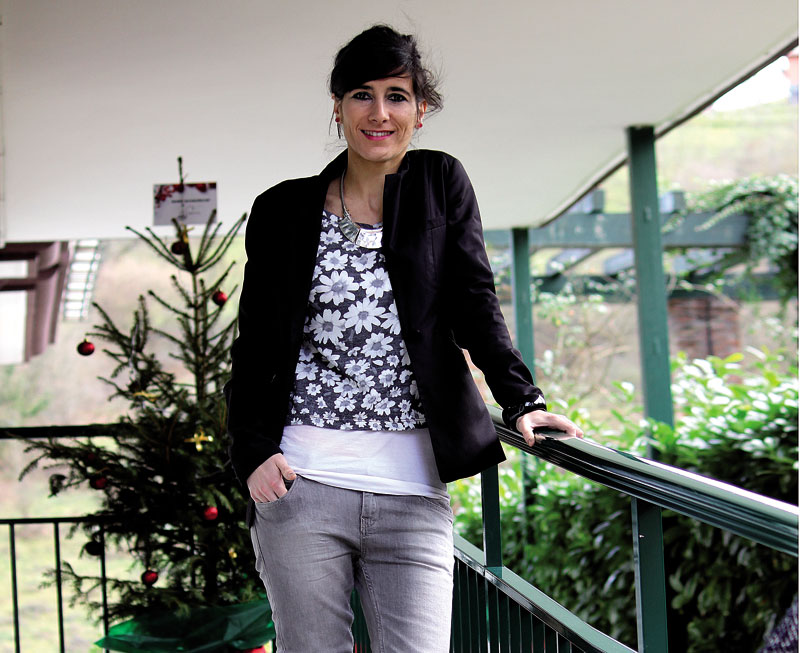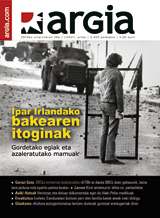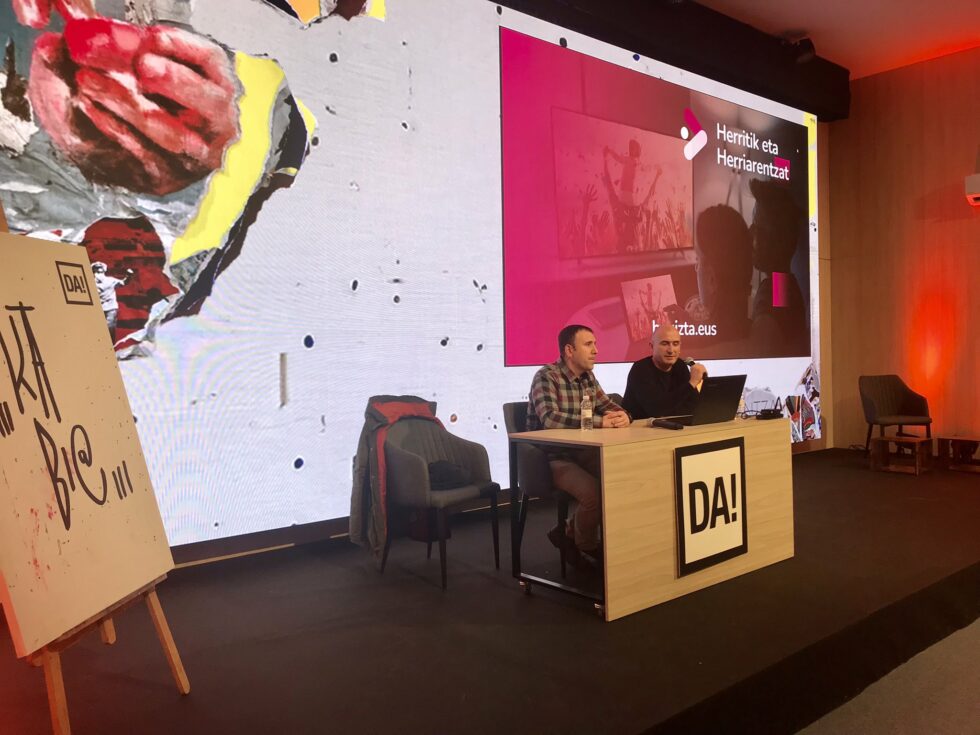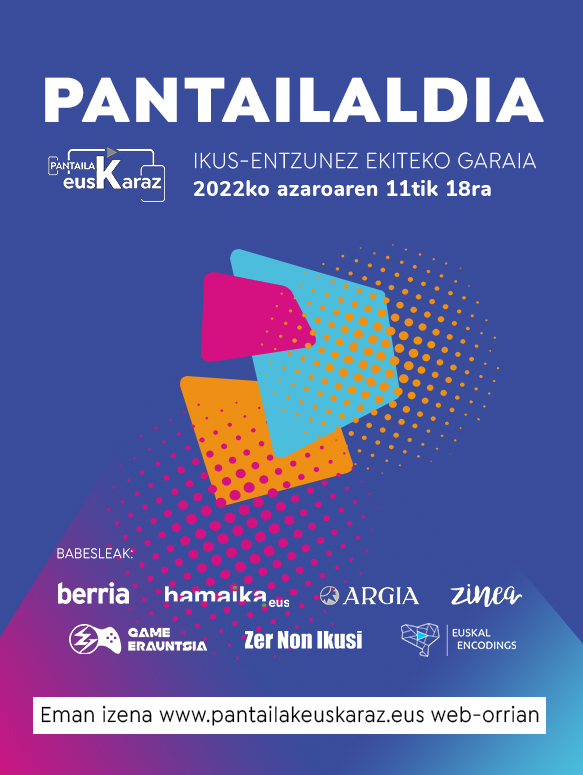"At the end of this process, everyone is going to make television their own way."
- A 35-year-old Basque woman, born in Segura, who works on the BBC. Writer in Basque, who is making his way. Something that will teach us at home, learned in exile. In sight!

What does the BBC have about that great name, fame and fame?
Trust in work for many years, impartiality, being a cultural benchmark at the international level… Many things. People pay a £144 fee a year and, in return, expect something good. I mean, quality content. At first, I was also surprised by myself, I didn't understand people's trust in the BBC. No one was responsible for paying that fee. Nobody. On the other hand, I remember that in Spain an attempt was made to establish the canon and no progress was made. The BBC, for its part, is part of identity, people trust the middle, really.
What did the BBC have before they started working on it?
A global reference among the media: one of the largest television channels. I was attracted to the most interesting projects of the place, its grandeur, its importance, the number of spectators… Since I started working there, the people there have made me more, with a lot of talent. Without worry, they say: “We are not here for money, but for passion.” And it's true, because a BBC worker earns less than one who does the same job on the private chain. There are good people working on the BBC and, I know some of them, they've wanted to work there since they were young! A lot of interesting things for the BBC. On the other hand, it is a pioneer in many areas, always lives in the future, working on new projects. That gives me a lot of strength. I share his values of access to the audience, the local working class and the one he represents in English society.
He studied Telecommunications Engineering at the UPV/EHU, is doing management work on the BBC. It is surprising, in part…
I always have to say, I studied engineering, yes, but I've never worked as an engineer. She was three or four months old, after finishing her doctoral thesis, to introduce her. Meanwhile, I went to London to visit a friend. I've always been drawn to travel, to spend time abroad, and on this occasion, being in London, I said to myself: “Here I will try to find work.” I started working in a post-production office. He was a subsidiary of HBO, Warner, etc. They owned the DVD rights of their products in Europe and the Middle East. I started in project management, in the dissemination of DVDs, we would say in business development. I was there for three years. From there I returned to Bilbao, in a new technology consultancy, for the sale of a product related to interactive television. At that time I contacted many Spanish television channels. He also worked in the commercial field, not as an engineer. However, I wanted in London, here I saw myself more professionally limited, so I pointed to a BBC selection process and I was elected: “There’s no question. I'm going!" And so on.
We read it in Linkedin: Garazi Goia, BBC Chief of Commercial Management.
I worked long before I got there. I started in the division of channels, in the management that the eight television channels and the thirteen BBC radios could reach all the houses in England: agreements with regulators, agreements with the government, content development strategy… I started managing small projects and gradually became a strategy. I've gone from the bottom up and now I run the business management team. In one of them, we will work on the strategy of creating a new BBC channel; in the other, we will analyze the future of Internet TV… I manage financial and strategic proposals and present them to the management: cost, impact on the audience, impact on the work of competitors who are in the same market, in what position it is in relation to new technologies, not to make a coalition with other television…
So guessing the future is not going to be an easy task.
Very difficult! On the BBC there is a large research department, an R & D, a benchmark in the world. They investigate what can be done in the technical field, we bring their technical advances to the strategic. The BBC has a responsibility to bring more and more content and products to the audience, and it cannot stop with what it has. The canon gives the BBC three trillion pounds and much is spent on creating or buying new content, but there's another important part that's spent on designing strategies to get them to people. Strategies, I mean, to transfer content to the consumer not only on traditional television, but also through tablets, mobile phones and other more recent forms.
It's about walking on land where no one has walked past.
Difficult and at the same time interesting. I feel privileged because I am part of a group that makes these kinds of reflections. I am travelling across Europe, here and there, in Brussels, in the European Commission and in Geneva, in an institution that brings together all the radio stations, where it is clear that each country has its level, its speed. Spain is behind, for example, and Euskal Herria, unfortunately, has no presence in these European forums. England, for its part, is at the other end of the BBC classification. It has always been a reference point. There are Germany and France, well located.
Spain is behind, Euskal Herria has no representation.
Each media has to make an economic contribution to the institution and, therefore, see if EiTB is in the interest of this. Well, being there and listening isn’t bad, but I don’t know if that’s the priority… I, anyway, am in contact with people from EiTB, on a personal and professional level, with those in the direction and with those who are not, with those who want to make some attempts.
How do you see EiTB?
If television goes ahead, it makes bets, and if it doesn't have money it can't wager. There is nothing more than preserving what is there. If there is no money, you have great limitations to work on future projects. There are, however, interesting projects. EiTB à la carte, for example, I've followed very closely, it's very interesting. They told me, on the other hand, that the audiovisual sector is rather modest and that many people are not motivated. Wages go down, there is no job security... The closure of Valencian television... It is not the best environment to take risks.
The BBC does not have these concerns, as it has an income of EUR 3 trillion through the canon.
The BBC has won its strength. The canon, for example, is frozen for five years, but still, with the same amount of money, it's doing more. That is the challenge, to continue to respond, not to lose confidence in the environment, and to look forward through new projects and new intentions. Raising the canon is going to be very difficult. In 2017, negotiations between the BBC and the government will be resumed, and the fee will be increased, maintained or lowered, which will also show how the future will look.
Speaking of the BBC framework, I thought the United States was also there… Do
you believe? Yes, NBC, CBS and many other TVs have a lot of strength. Also other companies that are entering the world of TV or content, such as Netflix, Samsung or Amazon.
Maybe I think about that rain of Hollywood products. That great presence of the industry, films and series, lots of children’s programs…
That's where you can be fine, when it comes to movies and series. The British series are very different from the American ones, they're said to have a different humor, and that's right. Things come from America on another scale, much more content, more money moves. However, the BBC is present in Europe and in the world. For example, it has a very powerful documentary series. There are also educational programmes, such as competitions and, above all, informative. They have international recognition.
What does it tell you that it adapts to some EiTB managers? Do you have any recommendations?
It's not easy. For example, for EiTB the BBC may not be the reference or, at least, the important thing would be to be able to adapt to the EiTB scale. If you don't have the context of the BBC, the push, the structure -- comparisons are unnecessary. It may be worthwhile to understand what the parameters of success have been in England, to think about whether the factors that have worked there are also worthwhile, what will work in Euskal Herria. At that level we talked. When we talk about new technologies, for example, we reflect on where they are going, how they are reflected on television… In England it is clear that at the end of this process television will do something tailor-made. “What pulls me on TV I will see it” won’t be. Everyone will be able to see whatever they want, wherever they want, whenever they want, on whatever device they want. We're still far from that, but that's where the future lies. The BBC has made a big bet on this. The contents are of great value, so instead of having the products stored in the file, they should be made available to the viewer, customizing the television. EiTB does not have the capacity of the BBC, but it could think of how its action adapts to major budgetary differences and constraints.
What does non-English television in the United Kingdom do? From Wales, from Gaelic…
The Gaelic has a chain, the BBC Alba, founded in 2008. It only emits in Gaelic. There were, of course, political reasons behind its implementation, but, despite that, the BBC has a responsibility to preserve the different cultures of the United Kingdom. Of course, a community of 70,000 people means a low audience. I was interested to see the project, to follow it, and the illusion of the people of Scotland in that project. People here would have to learn a lot from there. In the musical, for example, you have a really interesting scalp. Many cartoons are also issued, of course, for children. On the other hand, in Wales there is S4C, Gaelic television, and there are many more Gaelic speakers than in Scotland. He's still there. However, in 2009, HD Gaelic TV was broadcast on the Internet. His name was Clirlun, it means “clarity.” It was a large-scale investment, with a limited hearing, and two years later it had to be closed down because of the cutbacks it suffered.
Are the two ETB chains needed, the Basque and the Spanish? There are always the third and Etbsat.
In short, television is a useful tool for promoting the culture, language or communication of a people. That is why Euskera is certainly needed. We should see it, make a strong commitment to the chain in Euskera and see the results, the audience and others. But closing ETB2, for example, I don't think it's real, because here are people who consume content in Spanish. I always believe in achieving balance; how to boost Euskera and culture, how to change people’s habits, how to wager on making content of the same quality and weight in both chains. Now the balance is in favour of Spanish, and that is a pity.
Let us therefore leave the BBC and EiTB. You are a writer. The last book is titled Una (des)herrira, as one reader knows more than one. Tell me what the exile of the one you live in London is.
My exile has been chosen by me and, precisely, my distance from Euskal Herria has brought me closer to it. It has given me another perspective, and I now understand my country better. It seems to me that here we have some ghosts of the past with which we will fight without taking a step forward. Leaving them behind is necessary to move forward, but to win that fight with those ghosts does not serve the rules and rhetoric of always. I believe that to define the new rules or rules it is necessary to listen to others, to adopt other looks or to establish a distance. Getting out helps in it. It has helped me a lot. That is why I say that he has approached me. On the contrary, literature and literary works help me even more to cut that distance, to make it shorter.
Garazi Goia (Segura, 1978) Telekomunikazio ingeniaritza ikasketak egin zituen Bilboko EHUn. Hala ere, inoiz ez du ingeniari lanik egin. Kudeaketa lanean ari da BBCn, Londresen, joan deneko zazpi urtean, etorkizuneko estrategiak pentsatzen. Irakurle amorratua da eta txanponaren beste aldea ere gaztetatik bizi du: idazle da. Bi hitz eta Txartel bat (des)herrira ditu orain arte argitaratuko lanak, eta ipuina du Orgasmus lan kolektiboan ere. “Jaioko dira berriak” kantatu zuenak bazekien zer edo zer. Berri horietakoa da Garazi Goia.
Ez dugu jakiten zertaz ari diren “burmuinen ihesa” diotenean, zer nolako jendea dugun etxean, harik eta herritik kanpora bide ederra egiten hasten diren arte. Horietako batekin gertatzen garenean hasten gara entenditzen zer esan nahi duen “burmuinen ihesa” terminoak. Garazi Goia bat gurean ez edukitzeak eskasago egiten gaituela, ahulago, hauskorrago. Geure izaera indibidual eta kolektiboa indartzeko aukerak modurik zozoenean ihes egiten digula. Joaten uzten diogula.
“Txikitatik izan dut literaturarekiko zaletasuna. Irakurle sutsua izan naiz, etxean ere liburu asko izan dira beti. Hortik datorkit interesa. Gazterik hasi nintzen idazten eta lehiaketetan parte hartzen. Urruzuno saria irabazi nuen 1996an, eta, aurretik, bailara mailako lehiaketaren bat. Irakurtzeko zaletasunak bultzatuta hasi nintzen idazten. Horrela etorri zen nire lehenengo lana, Bi hitz, 2008an, Londresen ari nintzela lanean”.
"Txartel bat (des)herrira guztiz ariketa ezberdina izan da. Askoz landuagoa da, ni ere askoz kontzienteagoa nintzen zertan ari nintzen. Bestelako ariketa izan da, atzetik bilaketa lan handia egin nuelako, gerrako haurrei buruzko alde historikoa behar den bezala erakusteko. Gerrako haurren gaia beti iruditu zait interesgarria. Seguran, behin, Ingalaterrara joandako haur haietako baten semea ezagutu nuen aitaren bidez. Londresera berriz, ea han zer edo zer aurkitzen nuen joan nintzen
“Idatzi egiten nuen, argitaratzea pentsatu gabe. Halako batean, nire idatziak forma hartzen ari zirela sentitu nuen. Orduantxe pentsatu nuen, akaso, egiten ari nintzen lanak liburu itxura har zezakeela bukaeran. Helburu finkorik gabe aritu nintzen idazten, askatasun osoz idatzi nuen, eta askatasun horren fruitu izan zen Bi hitz”.
Kanaldudek internetetik gure etxeko telebistetara jauzi egin du. Oraindik goiti, Free, Bouygues eta Orange internet hornitzaileen telebista boxen bidez ikusten ahalko da. Orain lanean ari dira SFR-en bidez ere ikusi ahal izaiteko. Horrez gain, webgune berria estreinatu dute... [+]
On the eve of the holidays a friend and I have managed to get together to catch a boat. We are on the table to discuss, albeit briefly, our last issues. I have a dear friend, but our lives make us less than we would like.
We use the delicious tar-tar. Shortly thereafter, a... [+]
B. It is one of the television references that marked the adolescence of A. He would like A to be an actor known as B. They both have a gang of friends that doesn't come out of the ordinary, but what differentiates is adolescence. B lived a stranger, participated in a public... [+]
I have not seen Teleberri for a long time, but for reasons that do not come to my rope I have been touched on the nights of Saturday and Sunday. And it is clear to me why I stopped putting television news.
Many years ago I was very pleased to see the informative ones, but over... [+]























